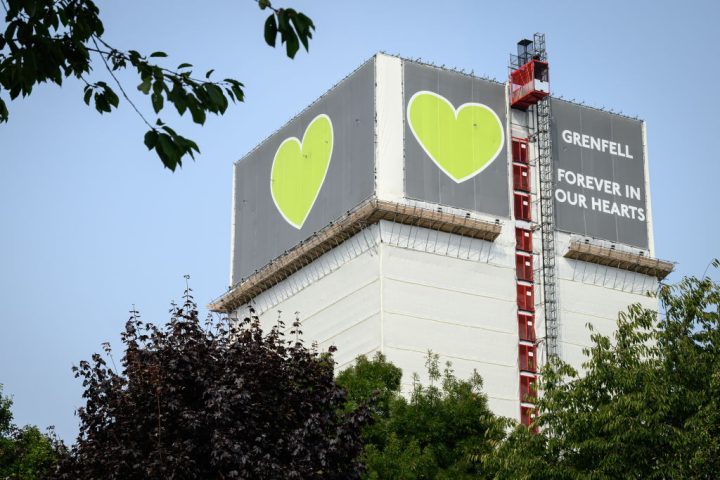I am suffering – and I hope readers will bear with me – a failure of imagination in the aftermath of the Grenfell report. Not a total failure, mind. It is all too easy to imagine how failures of regulation, of maintenance, of oversight, contributed to the Grenfell catastrophe. It’s easy to see how, here and there, and without malice, but with disastrous consequences, amid fraying budgets and overworked bureaucracies, the people and systems which should have ensured that the tenants of Grenfell Tower were safe did not. A cascading series of small failures, missed opportunities and rules honoured in the breach. That, we can all picture.
What is nearly impossible to imagine is how, in pursuit of still more profit, the companies contracted at handsome fees to supply supposedly flame-retardant cladding draped that high tower with what might as well have been firelighters. That they did so knowingly; that they did so in defiance of regulations – simply lying about the materials they were using and cheating the safety tests; and that they laughed about it amongst themselves as they did so.
It seems to me that this shouldn’t be a matter of jurisdictional wrangling
The inquiry heard, for instance, that Kingspan’s employees – having got their insulation assessed as suitable for use on buildings more than 18 metres high by the simple expedient of submitting a different material for the test than they were actually selling – giggled over email: ‘LOL’; ‘We lied?’ ‘All lies mate. Alls we do is lie here’. A named executive, Philip Heath, when a contractor queried whether the material was fit for purpose, told a friend: ‘I think they are getting me confused with someone who gives a dam [sic].’
Two other companies – Arconic and Celotex – also supplied unsafe materials; and while their executives did not apparently leave so incontinent and grotesquely goonish an email trail, the inquiry found that both companies had cheated the tests too. The former ‘deliberately and dishonestly’ misled regulators; the latter had a ‘dishonest scheme to mislead customers’. Arconic didn’t even bother to give oral evidence to the inquiry.
I say ‘nearly impossible to imagine’. Still, we’re on ‘nearly’: the world is full of crooks and shysters and greedy, boastful cheats (and they seem from this to be over-represented in the commercial cladding industry). That they will have revelled in their behaviour, while suffering a failure of imagination themselves – the failure to imagine that a few years on their cheating could have cost 72 human lives – is not outside the bounds of our experience.
Nope. What seems to me quite impossible to conceive is what Michael Gove set out in a mortifying article in yesterday’s Sunday Times: which is that not only are these three companies yet to acknowledge fault or make amends, but that Treasury pragmatism and international realpolitik is thwarting attempts to make them do so. Kingspan is based in Ireland; Arconic and Celotex in France. As Mr Gove writes, ‘I pressed the Irish government to act against Kingspan without success. From France only haughty froideur‘, while ‘efforts on my part to restrict the import of these companies’ products ran up against the commercial purism of Treasury Mandarin Brain’.
Mr Gove says that he fears that people within Whitehall – who will, no doubt, pride themselves on their cool-headed sophistication – are likely to block the pursuit of justice under the new government:
In Whitehall I know there will be voices opposed to robust action. Those saying these companies can be partners in combating climate change. Those arguing that we shouldn’t pick fights with EU neighbours when we want a closer commercial relationship. Those claiming that pursuing individual companies abroad will send a negative signal on foreign investment when the priority is growth.
Cool heads and sophistication and commercial purism be damned. Are we – having supposedly asserted our sovereign identity with the Brexit vote – really so weak and abject that, for fear of rocking the boat with our neighbours, we daren’t pursue justice from people whose greed and dishonesty cost 72 British lives? Can those neighbours, come to that, be so low and venal as to wish to protect those crooks?
It seems to me – as it apparently does to Mr Gove – that this shouldn’t be a matter of jurisdictional wrangling, ‘Treasury brain’, or so-called realpolitik of any sort. This wasn’t a regrettable misjudgement: it was deliberate and systematic dishonesty. Wherever they are quartered, these companies should be going to the wall, and the executives responsible for deliberately cheating the regulators should be going to jail. They should be pariahs in the money markets, and pariahs as far as contracts to clad so much as a garden shed from now on go.
In the context of the 2008 financial crisis we heard a lot about the concept of ‘moral hazard’: the idea that if banks were allowed to take dangerous risks with impunity they would be incentivised to take those dangerous risks. Same argument here – with ‘moral’ in that phrase taking on a special pungency. It’s both pragmatic and the right thing to do to ensure that companies which take that sort of cynical risk with human life, and what’s more do so in direct and knowing breach of the law, suffer the very gravest consequences. I’m with Mr Gove.








Comments